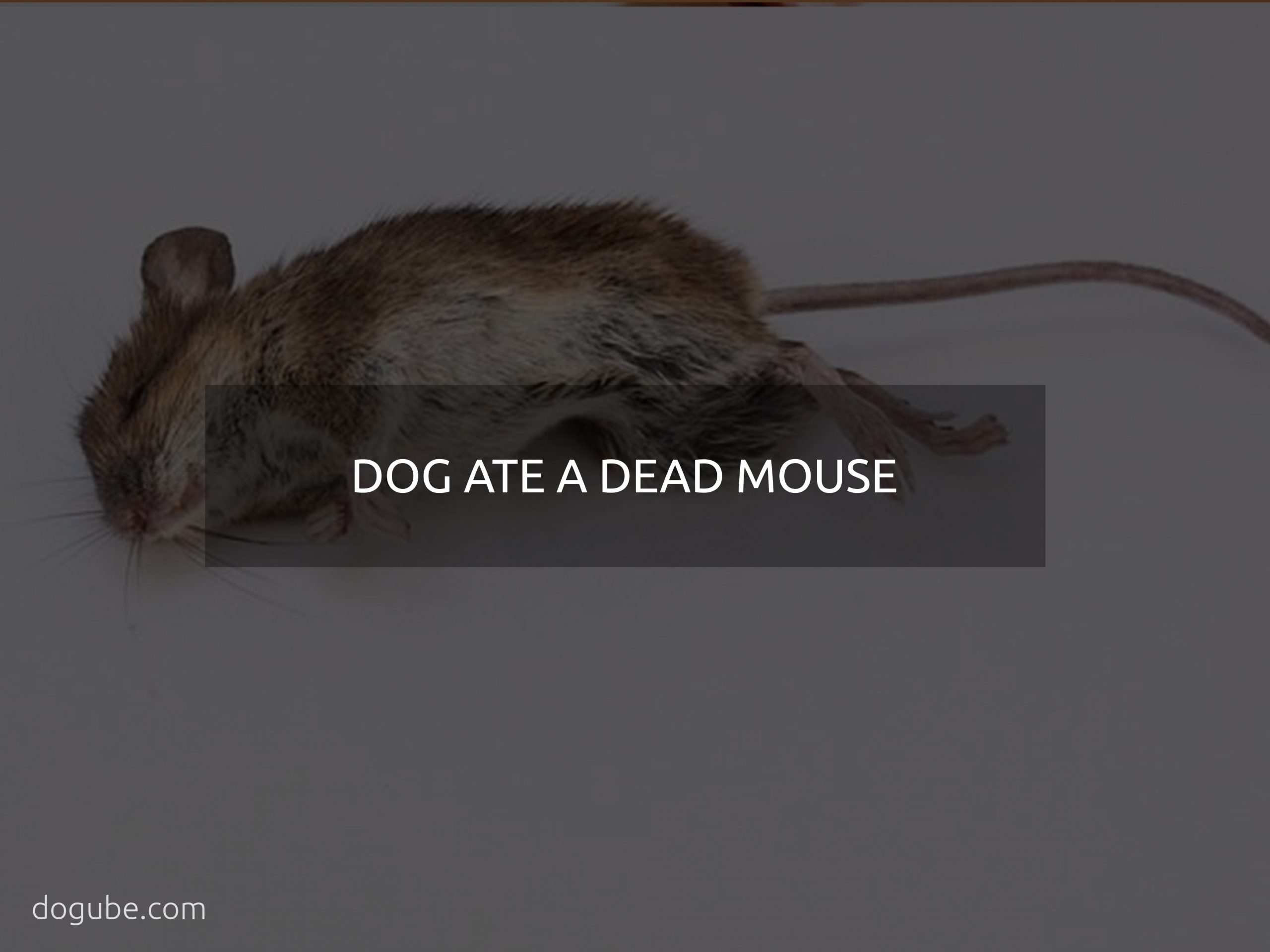Did your dog consume an animal? Rat’s are among the most dangerous creatures. For centuries, they’ve been snatching food from small gaps or chewing holes to get into places where food is stored. After depleting the pantry, they can easily getaway. They’ll leave an odor trail and footprints that are contaminated.
Dogs like to eat things they shouldn’t, which sometimes means the unthinkable. If your dog ate a dead rat(or other dead animal’s such as a dead bird, dead rodent, and any other dead thing), it’s important to act quickly. So what should you do in this situation?
Before the mousetrap was developed, the use of dogs was to guard the food stores and keep living spaces clean. The dog breeds of terriers were bred specifically to capture rodents. They’re tiny enough to pass in tight spaces and can dig well enough to enable pursuit across all terrains.

How could a dead mouse be dangerous?
The main concern should be whether or not your pet has been poisoned since it is an emergency medical condition. There are a few types of common rodenticide poisons commonly used in mouse traps. This rodent poison can cause bromethalin poisoning in dogs, leading to blood clotting.
However, even if the mouse was not poisoned, it may be a source of illness for your pet when carrying a pathogen or harmful bacteria. There’s always the chance that your pet might stumble upon dead rats on your evening stroll. Most likely, he’ll be inclined to examine the dead animal to see the taste.
Be aware that many household pets of today were hunting dogs or even retrievers from deadly predators. If your dog has this behavior, you should be mindful of whether the mouse was poisoned. It’s impossible to determine the level of poison contained in this mouse. Therefore it’s difficult to determine if it’s enough to cause death to an animal. The reality is that it could cause death in a dog, and you shouldn’t take any risk.
You may like: how to tell if a dog is aggressive towards cats?
Can a dog get sick from eating a dead mouse?
A dog may get sick from eating a rodent. Several types of illnesses can be triggered. The most well-known ones are:
Roundworm
Roundworms are thought to be one of the most frequent issues that arise from eating mice. As dead, as well as alive mice, are excellent targets for roundworms. The symptoms of roundworms like unhealthiness, vomiting, and diarrhea.
Toxoplasmosis
A particular kind of bacteria causes it; the toxoplasmosis disease is commonly seen in mice. It can be a severe illness that causes organ failure and a weak immune system that could be life-long. It is particularly dangerous for puppies or pregnant dogs. The symptoms include weakness in muscles and fever and neurological problems (such as brain fog).
Leptospirosis
A different kind of bacteria causes it. This could cause an infection to your pet, resulting in death quickly. This is among the most serious complications as the signs are mild and can be overlooked while looking for the signs. However, you can look for signs such as increased thirst, decreased appetite, and vomiting.
Salmonellosis
It is an infection that could lead to death if left untreated. Although it’s not common among rodents (compared to the issues mentioned above), it’s something to consider. Signs of dehydration include being in shock and fever.
Secondary poisoning
If your dog has eaten an animal that died, then this is likely to be one of the most serious and probable issues. Because poison likely killed this mouse. It’s expected to be consumed by your dog as natural pet food, and the pet will be poison in the system of its. The symptoms of secondary poisoning are blood in his poop or pee seizures, bruises under the skin, or pale gums.
Can dogs digest the whole mouse?
Mostly yes. Rats are tiny and are broken down very quickly by the acid in your dog’s stomach and digestion. There may be bones in their poop! If you are a puppy or a tiny dog, there is a chance that you could be suffering from an obstruction within the digestive tract of your dog.

How can an uninvolved mouse pose a danger to dogs?
Even if you’ve never encountered an issue with rodents and there’s no evidence within your home, there’s an opportunity that your dog could experience a dead mouse while on your evening walks. Most likely, he’ll be inclined to examine the dead animal to determine the taste. Keep in mind that most pets are hunting dogs, or at the very least retriever from dead animals. They don’t find it offensive to put dead animals in their mouths.
It’s an instinct for most dogs, and the smell does not seem all that obnoxious to the dogs. If your dog is doing this, the first thing to think about is whether or not it was a poisoned mouse. There is no way to know the level of poison in the mouse, so it’s difficult to know if the poison is enough to cause death to an animal. However, it can indeed kill a dog, and it’s not worth taking any risk. There is also the possibility of developing a disease. Mice may carry different parasites and bacteria, including roundworms. They can lead to serious health problems, so you must visit a vet or call a pet poison helpline even if your dog appears to be okay after eating the delicious dead mouse.
What is it that draws dogs to dead animals?
As with many things that happen to dogs, it all boils down to smell. The smell attracts dogs that the dead animal emits since this smell can get worse as time passes (and decay), so it’s not surprising that dead animals become more intriguing for your dog.
There are several reasons dogs are attracted to smells that make us gag. A common theory is that they trace the origins of the scent back to dogs prehistoric wolves who may have vital motives for being around disgusting things like feces and dead animals. Strong smells of these items could mask the dog’s (or the wolf’s) scent, which aids in keeping her safe from predators. It’s the exact human case. “Humans recognize odors as bad via either an inherent evolved mechanism that has been acquired to avoid injury, e.g. the repulsion of feces in order to prevent diseases or by learning” Peter Hepper, head of the psychology school in Queen’s University in Belfast, explained to Gizmodo.
You may like: long haired frenchie
What should you do if your dog ate a dead mouse?
Mice aren’t necessarily dangerous to dogs. Animals in the wild have consumed raw meat for hundreds of years. It’s part of their DNA. Naturally, if you want to add raw meat into your dog’s diet, you must start slowly with the occasional dog food that isn’t a threat to their existence. However, mice are often apprehensive, and the dog you feed eats rats wandering around the yard. It is recommended to call your veterinarian and inform them of the situation.
Will rat poison kill dogs?
Rat poison could kill your dog if it is consumed. It’s a highly poisonous and dangerous substance that could be fatal if ingested by any animal. In simple terms, the poisons of rats and dogs don’t mix, so they must be kept separate from one another. This applies to large and small dogs.
The issue is in how rats poison is employed. When it’s in the open to attract rodents and mice, the same factor that draws rodents also attracts dogs. For instance, poisons for rats contain scents and flavors that are designed to draw rodents and mice. However, they can also be sniffed quickly by curious dogs and eaten or licked.
There are four kinds of commercial rat poison available on the market, two of which are unsafe for dogs to lick or consume.
- Anticoagulant rodenticides Could cause your dog to suffer internal bleeding, coughing, and vomiting of blood. It can also result in the presence of urine and feces containing blood. It is possible that you will not notice symptoms of poisoning until three to five days following the dog has eaten.
- Cholecalciferol: This rat poison is vitamin D3-based and can lead to your dog suffering from acute kidney failure. For example, a small amount of it could be fatal for a dog, and it’s extremely difficult for the vet to manage.
- Bromethalin: This mouse poison is extremely dangerous to dogs since it can cause their brains to swell and cause death. The symptoms usually show up within a few hours.
- Aluminum and Zinc phosphides release poisonous phosphine gasses in the dog’s stomach, causing seizures and liver damage.

Conclusion.
Even mice that haven’t been poisoned may still transmit illnesses to your pet. It’s important to watch for wild mice when you go on hikes or camping. Making sure your dog has very little contact with mice can reduce the chance of inhaling toxic substances and will help you stay away from any urgent visit to the vet clinic!




